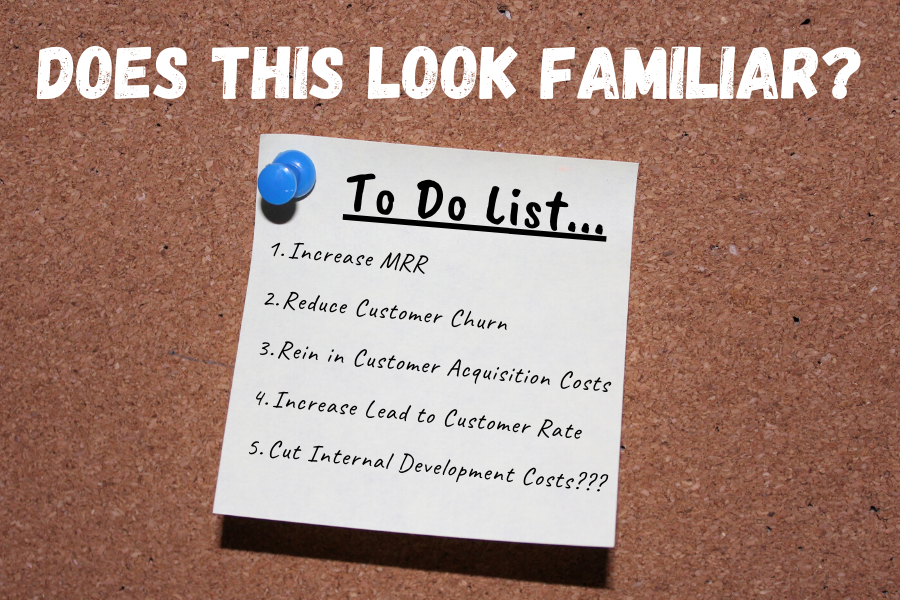If you’re on the leadership team of a B2B SaaS company, it probably does. With competition in cloud software heating up and the economy slowing down, your shareholders are nervous and they’re asking you to do the impossible… again.
Don’t panic… Find an Integration Partner!
Many SaaS companies have found that partnering with a 3rd party development company allows them to get more by spending and doing less!
How, you ask? Let me explain…
“We really love your product, but it doesn’t integrate with our [insert software platform here].”
This is a common objection from B2B SaaS prospects. They love your product, it solves their problem and they even like the price. On the other hand, implementing your product may generate redundant entries into multiple software platforms or it could create issues that cause their reporting to be incomplete and/or inaccurate. So, how can you overcome objections like this and push the sale across the line?
Hint: Do NOT call your Software Development Manager. Demanding your internal development team to abandon their current sprint, spending the time and money to immediately add this feature is not the answer. For the sake of your company, please don’t do that… Your software team is expensive and their time is valuable!
The better option… Call your Integration Partner!
Who or what is an Integration Partner?
An Integration Partner (IP) is a trusted 3rd party development company that is familiar with your product and can engage with your prospects/customers for integrations and various other development projects.
But, how can an Integration Partner increase my Monthly Recurring Revenue (MMR)?
An IP can aid by removing impediments to the sale, turning your prospect into a paying customer! Equipping your sales team with an IP should help them close more deals and increase Lead-to-Customer rates. An IP can also positively affect your MMR by increasing referral revenue. Oftentimes, SaaS companies receive referral fees from the IP for each deal they send their way. Shareholders love new revenue streams!
OK, but I’m a Customer Success Manager. Can an IP help with my Customer Churn numbers?
Absolutely! An IP can help increase your company’s retention rate by facilitating enhancement requests made by your existing customers. That feature they asked for 10 months ago can finally be addressed by simply introducing your customer to your IP.
You will be able to meet your customers’ expectations and make them feel appreciated without ever disrupting your internal development team’s agenda or budget.
My CFO says Customer Acquisition Costs (CAC) are too high?
Your IP can help with that too! With most IP arrangements, the prospect (or current customer) engages directly with the Integration Partner. Your sales representative or Account Manager makes a warm introduction to your IP and your partner takes it from there. Your 3rd party partner will provide your customer with a proposal, making these contractual agreements between your prospect/customer and the IP. No cost is incurred by your company and in some cases a referral fee can be collected to help offset CAC. When you have the right Software Integration Partner on standby, your Software Development Manager or CTO can keep his team lean and focused on the core product road map.
Bottom Line
Partnering with a 3rd party company to handle integrations just makes good sense. The right IP can help you increase revenue, decrease costs and retain more customers. The key is finding the right Integration Partner for your company.
Here are some things to consider:
* Remember, you’re looking for a partner. The relationship should be beneficial to both parties. The longer you work together, the greater value you will draw from the relationship. With each deal, your development partner will become more familiar with your product and your people. With the right partnership, you’ll close more deals together and both improve your development efficiency. That means more deals for you and less development time and expense for your prospect/customer.
* Research and vet your partners before you ever refer a prospect or customer. What experience do they have with integrations? Do they have the bandwidth to assist your sales team in a timely manner? Are they too big? Some 3rd party vendors might consider a small integration project as a waste of their time. Look for a partner that will value each and every referral. In any case, your partner should act as an extension of your brand, providing the highest levels of service, passion and care in every customer interaction. It’s not a bad idea to follow up with your customers after a project and get feedback on their overall experience. It’s ok to hold your partners accountable if they get complacent.
* The details of the arrangement should be clear to both parties. Will you whitelist their services? Is the arrangement exclusive? Be sure to discuss and document any referral fee agreement before introducing your IP to your prospects or customers.
* Commit to the partnership! Make sure your company’s sales personnel and account managers are aware of your 3rd party partnership, and have been educated on your IP’s full capabilities. Without commitment from all parties, you’ll leave sales on the table or end up churning customers you could have saved. Try dispersing marketing materials to your sales teams and account managers, this keeps everyone on the same page and delivering a consistent message. At a minimum, you should add your partners to your website. Also, make sure your partner has a support contact within your organization and that they are always made aware of any API or product updates. In other words, give them the access and information they need to succeed.

